
Trash Talking
Alanna Fairey
Converting Sustainability Plastic Optimex extruder Polykar Windmoeller & Hoelscher Corporation (W&H)Garbage bag producer leverages sustainability as key competitive advantage
They say that one man’s trash is another man’s treasure, but for Saint-Laurent, Que.-based Polykar, garbage bags just happen to be their bread and butter.
Founded back in 1987 by Elyse Damdjee and Aziz Karim, the family-owned business focused solely on the production of high-quality garbage bags for the ICI sector across Canada.
Fast forward to the present day, and the founders’ son Amir Karim has taken up the mantle as president and chief executive where Polykar diversified its products to include compostable bags, food-approved poly bags and multi-layered film for convertors from 2014 onwards.
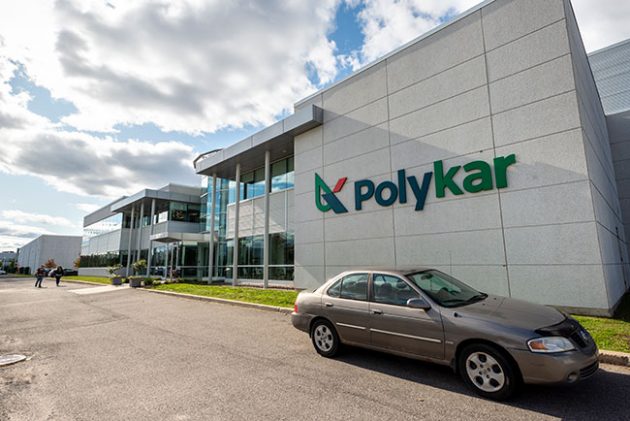
Launched over 30 years ago, Polykar’s headquarters facility in Saint-Laurent,Que., employs 110 full-time staff to design and manufacture fully recyclable and compostable garbage bags, food-approved polybags and multilayered plastic packaging films.
Polykar’s product diversification coincided with Karim’s desire to position the company to help educate the public on sustainability in the plastics industry, plastic end of life processes, and the environmental impact of plastics.
When the company was first launched over 30 years ago, Polykar made the decision to make garbage bags from recycled materials. As early as then, the company pushed the advantages of a recycled garbage bag and the positive environmental footprint they hoped they could advance in the industry. Coupled with the reduced cost compared to using virgin material, this win-win situation helped Polykar become more competitive.
As Polykar took off and dove further into the business of recycling plastics, Polykar was at the forefront of a sustainability movement within the industry before the general public had recognized it.
“Way before it became fashionable to talk about the environment or about sustainability, wewere using as much recycled material as possible,” Karim told Canadian Packaging in a recent interview.
“My family and the company never saw a conflict between being more sustainable and being competitive.”
Adds Karim: “the two went hand-in-hand.”
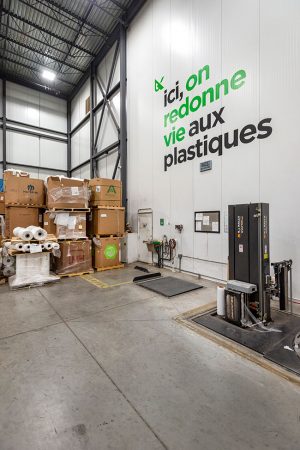
Translating to “we give another life to plastics”, Polykar has rooted their beliefs on sustainable practices, as all of their products are made from recycled plastic material and are fully recyclable and compostable.
To further accentuate the company’s commitment to environmental practices, Polykar’s manufacturing facility bears the internationally recognized LEED (Leadership in Energy and Environmental Design) silver certification, which verifies that Polykar identifies and implements sensible and considerable green building design, construction, operations and maintenance solutions.
Even though all of Polykar’s products are either recyclable or compostable, there is no denying that the plastics industry as a whole has been feeling the pressure of what Karim calls the issues of post-use life of packaging.
There have been significant developments in the industry over the years , as most plastic products are made today with higher performance resins, have much lower environmental footprint than in previous years, and are made with more recycled content.
Karim believes that there is a tsunami of negative news about the impact of plastic in the environment, which not only results in an improper use of facts, but a need for better education surrounding plastic.
“I think there is a lot of miscommunication about the benefits, the use and the afterlife of plastics,” Karim elucidates.
“It’s not because there’s not enough information––I think there’s plenty of information.
“The recyclability of some of the materials has significantly improved and there are a lot of good things that are happening to our industry which are making plastics more recyclable.”
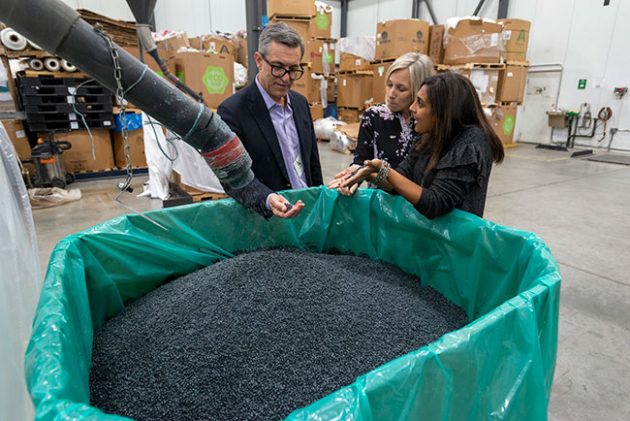
Communications and marketing manager Iffat Salaam Karim and marketing director Natalie Mountain explain to Canadian Packaging how Polykar reclaims discarded plastics into resins as a means of making their garbage bags.
Karim concludes: “I’m very confident that at the end of the day, science and facts will prevail over subjective opinions.”
When Polykar entered the converter film market back in 2014, Karim admits that they had no experience in dealing with this segment, but knew that they wanted to remain true to their high quality and sustainable values.
While Polykar had an excellent reputation for the quality and consistency of their products, Karim felt it was important to have the credibility of being a viable supplier in the polyethylene film market.
“The family did not come from a plastics background and knew little about plastic,” Karim says of the experience looking for reliable state-of-the-art machines.
“So the strategy was to use the best equipment in the world or available in the market so that we can come out with the best product,” Karim says.
It did not take long for Polykar to enlist the help of Lincoln, Rhode Island headquartered Windmoeller & Hoelscher Corporation (W&H), a leading supplier of machinery and systems for the manufacturing and converting of flexible packaging.
“W&H is basically the Rolls Royce of the extrusion equipment market,” Karim extols.
“We opted to buy the Rolls Royce because it would help to give Polykar instant credibility in this marketplace.
“The combination of the Polykar brand and reputation of the W&H equipment meant that nobody would doubt our ability to service them, and that allowed us to get into this business in an effective way.”
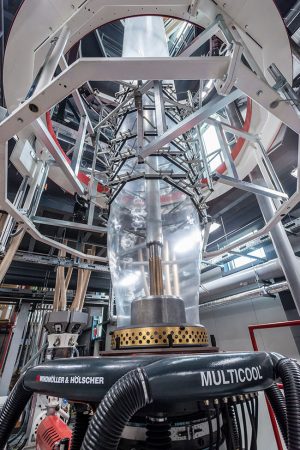
Calling them the Rolls-Royce of the extrusion equipment market, Windmoeller & Hoelscher Corporation supplied Polykar with three Optimex extrusion lines back in 2014 as a means to help Polykar continue on their path of reducing their overall carbon footprint.
From W&H, Polykar purchased an Optimex extruder, which was promptly installed at the 105,000-square-foot, 110-employee operation some time back in 2014.
Within three months of installation, Polykar saw an increase in their production. Impressed with the level of automation, Karim’s favourite feature of the extruder is the ease of use that comes along with it.
“For example, when you run a particular recipe or size of film, you can actually save the settings,” Karim explains, “for the next time you get a repeat order from the customer, the configuration is already there.”
“The higher level of automation allows you to maintain a certain level of consistency in your product that our film customers have now come to expect.”
In addition, a multi-layer extrusion line allows us to easily build multiple structures that give the different characteristics that are needed, in each layer.
According to Karim, the addition of the extruder has further helped Polykar to stay true to their values as a sustainable business.
“The fact that we’re now making multi-layer packaging, allows us to embed recycled content in the film structures,” Karim relates.
“Whether its to create a plan or structure that is a purely compostable package or whether we use a plan that in some layers you put more bio-based materials.”
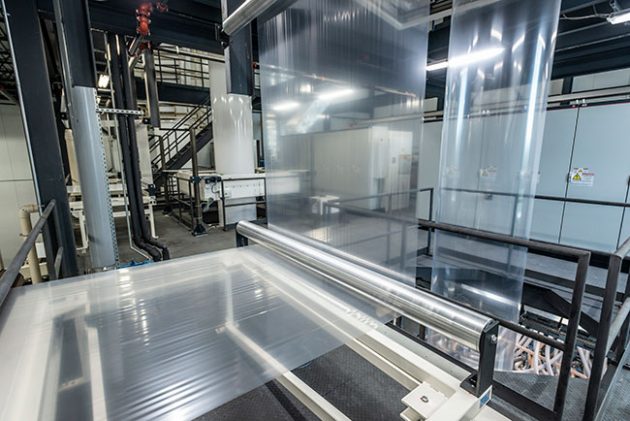
Within the first three months of its installation, Polykar saw a significant increase in their production, which they credit to the high levels of automation and the overall ease of use.
Impressed with the overall quality and consistency that the extrusion line has offered thus far, Polykar has added two more extrusion lines from W&H, including their third Optimex line installed at the facility last month.
With each installation of W&H equipment, Polykar continues to see a positive impact on their business and overall quality of their products.
“Overall, the W&H extruders enabled us to enter this new market of polyethylene film and it allowed us to extend our reputation for quality and consistency.”
Looking ahead, the future of Polykar looks busy, yet prosperous and fulfilling.
While production capacity has been maximized, it was recently announced that a second manufacturing facility based out in Edmonton is expected to be fully operational sometime in early 2021.
In an industry that will continue to change and evolve with the times, Karim firmly believes that Polykar will continue to strive to be the voice of expertise and educate the public with help of industry colleagues to provide thought and manufacturing leadership advancing environmental sustainability in plastics.
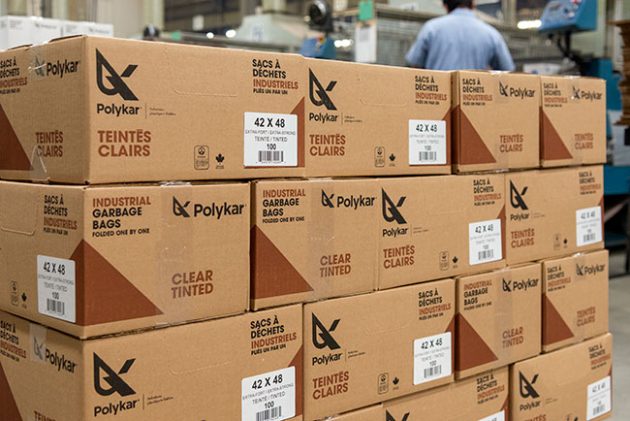
Once the garbage bags have been made, they are promptly put into corrugated boxes supplied from Mitchel-Lincoln before the product is shipped for retail sale.
“Those companies in our field that are not in tune with this new reality of making more sustainable packaging will start to decline, there is no doubt about it,” says Karim.
“But those that have been concerned about the post-use life of plastics and their environmental impact will continue to flourish.
“They will have to adapt to this new reality to continue to prosper and grow,” Karim concludes, “and Polykar hopes to be one of them.”
– Photos by Pierre Longtin
Advertisement

